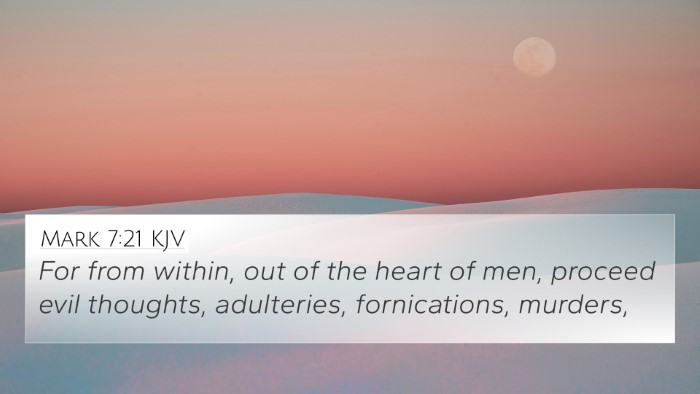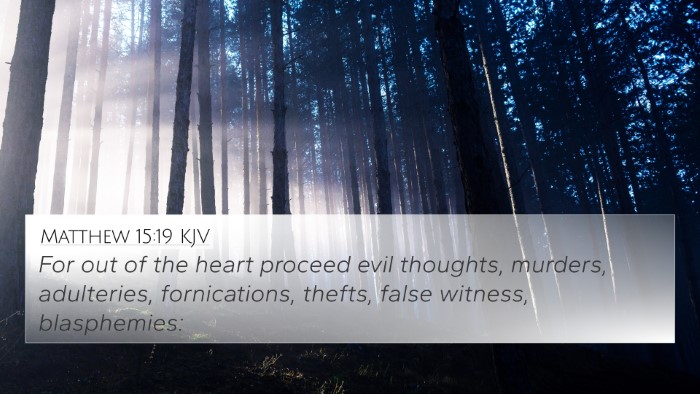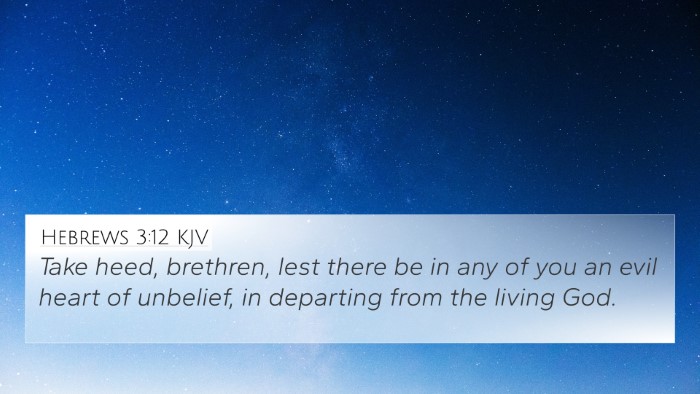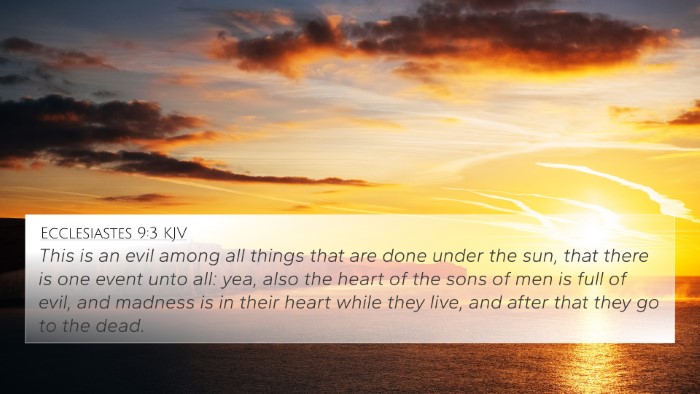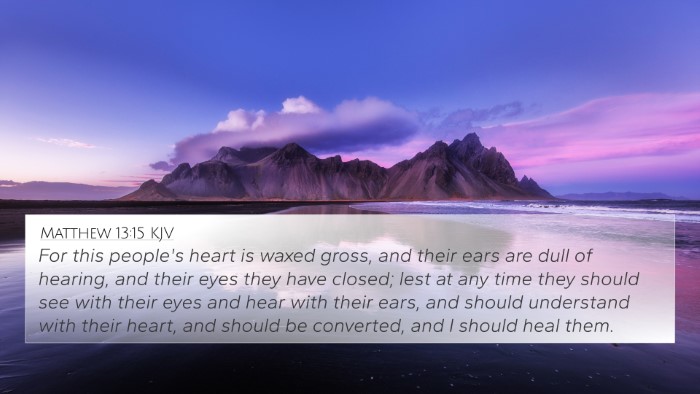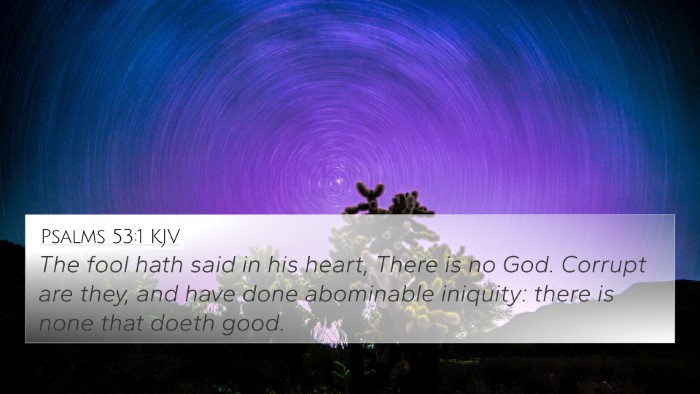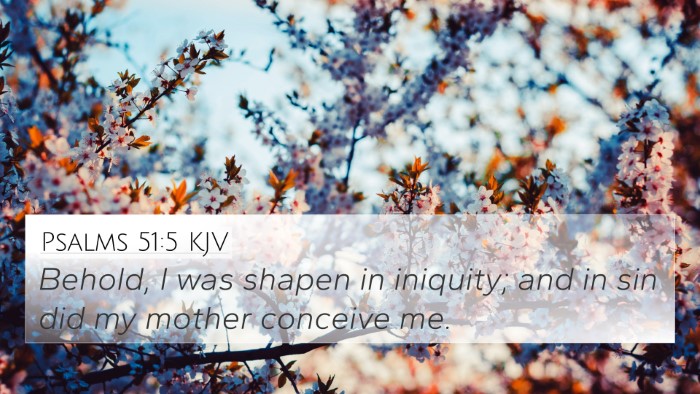Understanding Jeremiah 17:9
Jeremiah 17:9 states: "The heart is deceitful above all things, and desperately wicked: who can know it?" This verse serves as a profound reflection on the nature of humanity's innermost desires and intentions. Below, we explore its interpretations based on insights from public domain commentaries.
Verse Meaning and Context
In this context, the prophet Jeremiah is addressing the people of Judah, warning them against their reliance on false security. He emphasizes the inherent deceitfulness of the human heart, suggesting that what lies within is often more corrupt than we might realize.
Commentary Insights
Each of the following commentary perspectives contributes to a multifaceted understanding of this verse:
-
Matthew Henry:
Henry emphasizes that the heart, being the center of moral and spiritual life, is prone to deception. It is a source of sin and cannot be trusted. He suggests that while the heart may lead one to believe they are righteous, it often conceals sin. His commentary urges readers to seek a transformation of the heart through faith.
-
Albert Barnes:
Barnes notes that the heart is also a reference to the mind and moral character. He highlights that true knowledge of one's heart is beyond human grasp; only God understands it completely. This point reinforces the need for divine insight and guidance.
-
Adam Clarke:
Clarke elaborates on the wickedness mentioned in the verse, defining it in terms of the harmful results of unchecked desires and intentions. He comments on the necessity for individuals to engage in self-examination and to seek the Lord's discernment in understanding their true inclinations.
Bible Verse Cross-References
Jeremiah 17:9 connects with several other biblical texts, allowing for a deeper thematic analysis. These cross-references enrich the understanding of the human condition and God’s insights into human hearts:
- Proverbs 4:23: "Keep your heart with all diligence, for out of it spring the issues of life." This verse echoes the need for vigilance concerning the state of the heart.
- Matthew 15:19: "For out of the heart come evil thoughts, murder, adultery, sexual immorality, theft, false witness, slander." Here, Jesus affirms the corrupt nature of the heart, as noted in Jeremiah.
- Romans 7:18: "For I know that nothing good dwells in me, that is, in my flesh." This ties to the notion of inherent sinful nature addressed in Jeremiah.
- Psalm 51:5: "Behold, I was brought forth in iniquity, and in sin did my mother conceive me." This verse highlights the concept of inherited sinfulness.
- 1 Corinthians 2:14: "The natural person does not accept the things of the Spirit of God, for they are folly to him." This suggests that without divine revelation, understanding our hearts remains elusive.
- Jeremiah 10:23: "I know, O Lord, that the way of man is not in himself; it is not in man who walks to direct his steps." This reinforces the idea that human understanding is limited.
- Galatians 5:17: "For the desires of the flesh are against the Spirit, and the desires of the Spirit are against the flesh." This conflict mirrors the deceitful nature of the heart as mentioned in Jeremiah.
- Ezekiel 36:26: "And I will give you a new heart, and a new spirit I will put within you." This verse provides hope for transformation, contrasting with the claims of the deceitful heart.
- Hebrews 4:12: "For the word of God is living and active, sharper than any two-edged sword... discerning the thoughts and intentions of the heart." This verse emphasizes the necessity of divine insight to understand the heart's true condition.
- James 1:14-15: "But each person is tempted when he is lured and enticed by his own desire." This reflects the internal struggle inherent in human nature.
Thematic Connections and Implications
This verse is pivotal in exploring the broader theme of human sinfulness and the necessity for redemption. Understanding the nature of the heart leads to the recognition of the need for a savior. Jeremiah 17:9 serves as a starting point for recognizing our limitations, prompting believers to turn towards scriptural truths for guidance and transformation.
Tools for Bible Cross-Referencing
To derive additional insights from connections between Bible verses, consider utilizing various tools:
- Bible Concordance: This tool allows you to locate and reference words throughout scripture, identifying thematic connections.
- Bible Cross-Reference Guide: Many Bibles include annotations indicating related verses, providing an easy route to explore connections.
- Comprehensive Bible Cross-Reference Materials: These resources compile various relationships between verses, enhancing study and understanding.
Conclusion
Understanding Jeremiah 17:9 within the context of inter-Biblical dialogue enriches one's scriptural knowledge and faith journey. By exploring the complexities of the human heart, believers can grasp the transformative power of God’s word and the necessity of divine intervention in understanding our true selves.



